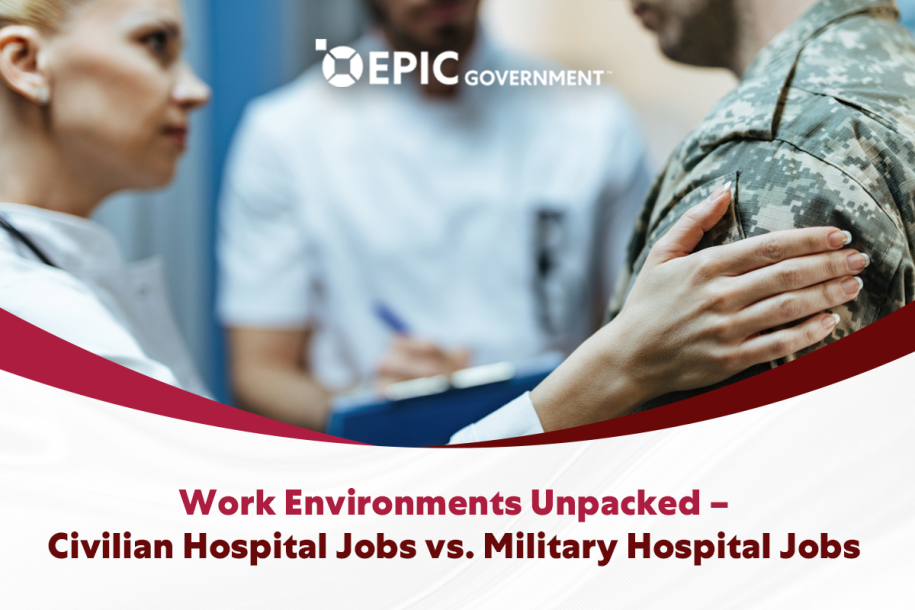Understanding the differences between civilian and military hospital jobs is crucial for individuals seeking opportunities in the healthcare sector. While both settings share the goal of providing medical care, they operate within distinct frameworks and have unique considerations.
Overview of Civilian Hospital Jobs
Civilian hospitals are central to the healthcare landscape, with the majority situated in urban areas across the United States. Managed under vertical hierarchies overseen by boards of directors, these hospitals, whether nonprofit or for-profit, serve diverse patient populations reflective of their respective communities. From infants to the elderly, patients span various backgrounds, cultures, and socioeconomic statuses, necessitating healthcare professionals who are culturally competent and adaptable.
According to the American Hospital Association, there are 6,120 hospitals in the U.S., predominantly community-based, totaling 84%. Hospital administration typically encompasses departments like patient care, finance, marketing, and human resources, overseen by administrators who ensure operational efficiency. Some hospitals specialize in areas such as pediatric care or oncology.
Patient care in civilian hospitals addresses a range of conditions, with common diagnoses including septicemia, heart failure, osteoarthritis, pneumonia, and diabetes mellitus, often requiring long-term management. This dynamic environment underscores the need for healthcare providers skilled in managing complex medical cases, particularly among older adults.
Exploring Military Hospital Jobs
As of 2023, there are a total of 45 military hospitals and inpatient facilities worldwide, with 31 located within the United States, alongside hundreds of ambulatory clinics. Military bases and their associated hospitals often serve in remote or strategic locations.
These hospitals operate under the oversight of the Defense Health Agency (DHA), a branch of the US Department of Defense. Unlike civilian hospitals, the primary mission of military hospitals is to ensure combat readiness by treating combat-related injuries and conditions, which is their paramount focus.
Within military hospitals, enlisted medical personnel collaborate closely with civilian healthcare professionals. The work environment is shaped by the military’s organizational structure, discipline, and hierarchy, distinct from civilian healthcare settings.
Patients in military hospitals predominantly consist of active-duty military personnel and their families, who have unique healthcare needs tied to their service. Unlike civilian hospitals, the demographic tends to skew younger, with the average patient age around 30 years, and many in peak physical condition.
Key services provided include ensuring peak health, treating injuries, and addressing trauma, aligning closely with military operational goals. Additionally, many military hospitals are actively engaged in research aimed at advancing these specific healthcare objectives.
Civilian Hospital Jobs vs. Military Hospital Jobs
Both civilian and military hospitals offer distinct paths for professional advancement and fulfilling careers in healthcare. Collaboration and dedication to patient welfare are central to both settings.
However, the work culture diverges significantly between civilian and military hospitals. Military hospitals operate under a structured hierarchy with strict adherence to military values and regulations. This includes clear chains of command and a strong emphasis on discipline, reflecting their mission to support active-duty military personnel, veterans, and their families. The focus here is on readiness and maintaining the health of the military force, fostering a culture of duty and camaraderie among staff.
Conversely, civilian hospitals serve a broader demographic, encompassing individuals from diverse backgrounds, cultures, and age groups. Healthcare professionals in these settings prioritize cultural competence to provide inclusive care tailored to the specific needs of each patient.
Both types of hospitals share a fundamental commitment to excellence in patient care, yet their organizational structures and missions shape distinct professional environments within the medical field.
Challenges and Rewards
Both military and civilian hospital jobs offer distinct challenges and rewards, shaping unique professional experiences for healthcare professionals.
Military hospital jobs require individuals to adapt to the structured environment and discipline inherent in the military system. Navigating a strict chain of command and adhering to military regulations can be challenging, yet many appreciate how these frameworks define roles and responsibilities clearly.
The rewards of working in a military hospital often include a profound sense of duty and purpose, as well as the satisfaction of collaborating within a cohesive team dedicated to supporting military personnel and their families. For those immersed in military culture, the opportunity to contribute directly to the well-being of service members is particularly motivating. Military hospitals also offer significant opportunities for professional growth through involvement in extensive research initiatives supported by the military.
Conversely, civilian hospital positions present challenges such as managing a diverse and often high-paced environment, staying current with healthcare advancements, and meeting the needs of a varied patient demographic. However, the rewards are equally compelling, including the fulfillment of providing care to individuals from diverse backgrounds, the potential for career advancement and specialization, and exposure to cutting-edge medical technologies. Urban-based civilian hospitals often provide access to cultural and recreational amenities, enhancing quality of life for healthcare workers.
In both military and civilian hospital settings, healthcare professionals play pivotal roles in improving patient outcomes and enhancing community well-being. The specific challenges and rewards vary depending on the nature of the job, the setting, individual preferences, and goals.
Conclusion
Military hospital jobs can be excellent opportunities for civilians. Finding the right fit requires understanding your values, long-term career goals, and the type of organization where you will thrive. For potential job seekers who would like to work in a military setting, an appreciation of military culture is essential. Visit Epic Government’s Job Openings page to discover more.
